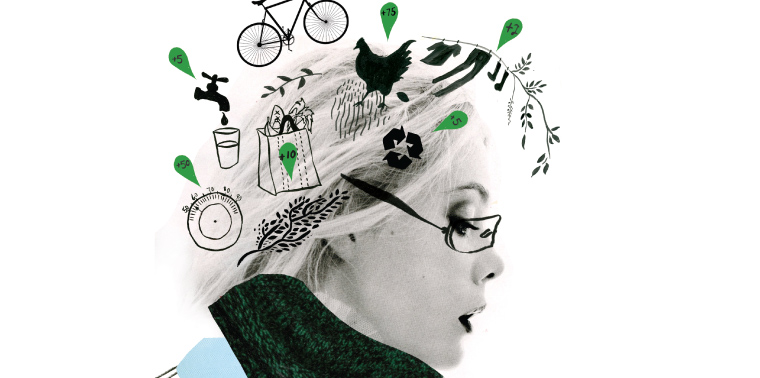In gamification, behavior is driven not only by social proof but also by competition. Several companies using Practically Green have employee teams that compete. “It’s hysterical,” Stevens said. “Every week when the ranking comes out, you see a massive flood of people in the group on the bottom that’s coming in to start to make more points. So it works.” She adds that the team aspect boosts participation in folks who might not otherwise want to play because they would feel they let down the others if they didn’t join in.
Since Stevens launched Practically Green, similar companies have emerged. Badgeville uses games, analytics and social networking to influence customer and employee behavior for more than 200 companies, from Dell to Panera Bread to Mother Nature Network, though only a small portion of their clients address social responsibility. Grant Williard launched an updated version of his JouleBug app, which encourages sustainable living activities such as water and energy conservation, recycling and other actions, at the 2012 SXSW Eco conference. Williard says he envisioned the app after using an online carbon footprint calculator that measured the impact of his lifestyle on the environment and getting an “awful score.” That led him to research how to reduce his carbon footprint. “I got a laundry list of tips, but they weren’t applicable,” he says. “It was winter and they were air conditioning tips.” He decided to create something bite-size.

©iStockphoto.com/V2images
“The only way to get people motivated is competition. So that’s when we came up with the idea of making it social, mobile and gameful,” Williard says. “When you’re on the subway on your way to work or you are standing in line, pulling out something like this that’s made to take 30 to 45 seconds of your time, that’s how we feel people will engage with sustainability.”
JouleBug provides reminders at particular times of day for appropriate actions—such as turning down your thermostat right before you leave for work (and the app can sync with a player’s utility company). Williard recently launched a business side to his consumer app, which sells universities, businesses, cities and other communities the right to use the app to encourage collective changes.
Getting to “Want To”
One of the groundbreaking aspects of gamification is that it bridges the gap between knowing and doing. Among the biggest misconceptions about promoting environmentally responsible behavior is that if people just knew about issues, that knowledge would compel them to change. This “deficit model” of communication—which says that giving people more information will change their view—has been widely discredited in recent years.
“If educating people about an issue would solve the problem, we would have no obesity and no smokers in our country,” said Lee Ann Head, vice president of research from Shelton Group, at the panel. Shelton, a marketing firm specializing in sustainability, found a conflict between values and actions in its annual Eco Pulse survey of American consumers.
“Two-thirds of American consumers say that conserving water is important to them and that they are concerned about the freshwater supply in the U.S.,” said Stevens. “When we ask about their activities … less than one-third have done anything in terms of changing their water habits—gardening or lawn practices or buying a water-efficient fixture for their home.”
So what changes behavior? “The first thing we think you need to do is wake someone up to their unconscious behavior,” Head stressed. “You have to make them feel a little uncomfortable about it, especially if they have an attitudinal belief that what they’re doing is wrong.”
Ensia shares solutions-focused stories free of charge through our online magazine and partner media. That means audiences around the world have ready access to stories that can — and do — help them shape a better future. If you value our work, please show your support today.
Yes, I'll support Ensia!

But policy makers and companies respond most quickly to the "will of the people". And most people don't just wake up one day and decide they need elected officials who will support a carbon tax or that they won't buy a washer that makes them push a button to turn off heat dry rather than making air dry the default for all washers. It's a journey to get people from "huh, I should do this" to "why is this so hard" to "there has to be a better solution". If game-based learning programs can help engage people to living and thinking in more conscious ways, I think they are a critical component of the grander solution we need.